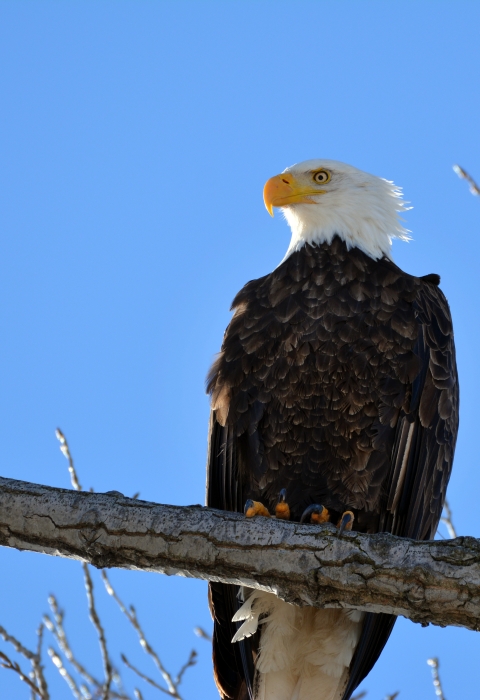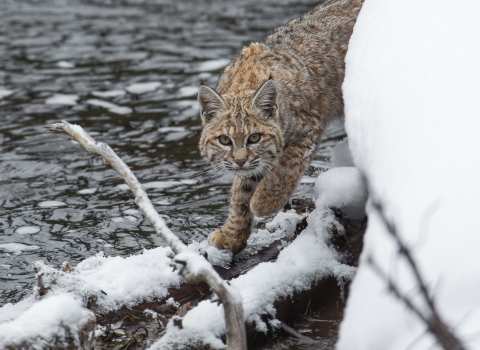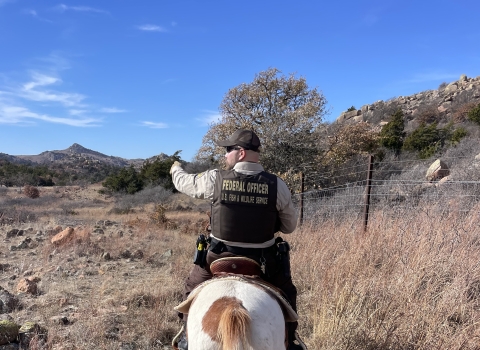Working together with the United States Attorney and Wisconsin Department of Natural Resources, the U.S. Fish and Wildlife Service Office of Law Enforcement continues their education effort in support of wildlife as they fight the devastating effects of euthanasia drugs.
John W. Vaudreuil, United States Attorney for the Western District of Wisconsin, announced the successful completion of the April 2012 agreement reached between the United States and Jennifer M. Primich, 37, of Phelps, Wisconsin, in connection with the accidental poisoning of bald eagles on April 9, 2011, at a landfill near Eagle River, Wis.
Pursuant to the pretrial diversion agreement, Primich agreed to complete 12 hours of community outreach at County Humane Societies, specifically addressing the secondary mortality effects of using euthanasia drugs.
Ms. Primich made presentations to the following 12 organizations:
- Oneida County Humane Society (formerly Rhinelander Animal Shelter, Rhinelander, WI)
- Lincoln County Humane Society, Merrill, WI
- Hope Animal Shelter, Ironwood, MI (also serving Iron County, WI)
- Forest County Humane Society, Crandon, WI
- Chequamagon Humane Association, Inc., Ashland, WI
- Rusk County Animal Shelter, Ladysmith, WI
- Taylor County Humane Society, Inc., Medford, WI
- Clark County Humane Society, Neillsville, WI
- Jackson County Animal Shelter, Black River Falls, WI
- Monroe County Animal Shelter, Sparta, WI
- Adams County Animal Shelter, Friendship, WI
Catkins Animal Rescue, Inc., Park Falls, WI “Historically, we have been working with our state and nonprofit partners in conservation for more than 20 years to avert tragedies like this,” notes Office of Law Enforcement Resident Agent in Charge for Minnesota, Iowa, and Wisconsin Pat Lund.
“The best we can do is teach shelters, veterinary practitioners and pet owners…and stay vigilant,” continues Lund.
United States Attorney Vaudreuil praised Ms. Primich’s efforts stating, “The goals of this pretrial diversion agreement have been completely met. The dangers and risks from the secondary mortality effects of euthanasia drugs have been described to many humane societies and shelters in the Western District of Wisconsin. I am confident that wildlife that might otherwise have been harmed is safer today.”
Seven bald eagles were found comatose and near death near the landfill on April 9, 2011. An investigation conducted by the United States Fish and Wildlife Service and the Wisconsin Department of Natural Resources established that the eagles were poisoned accidentally after feeding on the remains of euthanized animals. Primich had sent the remains to the landfill on behalf of the Vilas County Humane Society.
On June 1, 2011, after weeks of intensive care, the eagles - three adults and four juveniles - all recovered from the euthanasia toxin and were successfully released back to the wild at Antigo, Wis., by Marge Gibson and her staff at the Raptor Education Group. Thus, the largest and most successful rescue of poisoned eagles came to a dramatic and happy completion.
Given the serious, but accidental, poisoning of the eagles, Vaudreuil decided that an appropriate resolution of this case was for Primich to complete one hour of community outreach per month for 12 months at county humane societies, addressing the secondary mortality effects of using euthanasia drugs. Primich has now successfully completed this agreement, and there will be no criminal charges filed.





